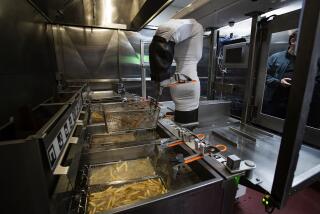New Outlook on Labor Helps in Chrysler Renaissance : Autos: Executives like Dennis Pawley stress openness, accountability. The UAW has responded.
- Share via
DETROIT — Dennis Pawley, one of the executives responsible for Chrysler Corp.’s car-making renaissance, knew the easy way out when problems surfaced with the new Neon cars.
He figured it was the wrong way out.
“The easiest thing would have been a coverup,” Pawley said of the engine problem that resulted in Chrysler’s Feb. 4 recall of all 15,000 Neons--the No. 3 auto maker’s highly praised new subcompacts.
Pawley and other Chrysler managers decided that if they publicized the problem and recalled the cars voluntarily, customers would have more faith.
Pawley, 52, the auto maker’s executive vice president of manufacturing, knows from experience that building lemons and fixing them later helped the domestic auto industry earn a reputation for shoddy quality.
The voluntary recalls, he says, are evidence that accountability by workers and managers is taking root at Chrysler.
When Pawley was told of the Neon problem, he ordered the Belvidere, Ill., factory shut down for a week until enough replacement parts could be made. Then he toured Chrysler’s Acustar parts-making plant in Huntsville, Ala., to find the problem, not fix the blame.
“I tried to turn that into a learning experience, rather than go down there with a rope like we would have in the past and hung somebody,” he said.
Pawley acknowledges that his tactics in dealing with workers have shifted dramatically since his days as a young General Motors Corp. plant foreman in the mid-1960s. Back then, shop floor supervisors were chosen as much for brawn as for brains. Pawley’s burly 6-foot-1, 230-pound frame made him perfect as a shop floor sentry to keep the United Auto Workers in line.
By his own reckoning, Pawley was good at “walking tall and carrying a big stick.” His enthusiasm earned him promotions and enemies.
One was Jerry Lewis, whose budding career as a UAW official paralleled Pawley’s advancement at GM. Neither man could initially stand the other, but slowly they realized they needed each other.
“He came to me before one of my elections and he said, ‘You know, we’re going to be here together. Maybe there’s some things we can do to make things better around here,’ ” Lewis recalled.
Later, Pawley’s word became good as gold on the shop floor. Lewis said he was fired once for stopping a production line because workers complained of danger from faulty machinery.
“Denny told me if I would keep my guys on the job, the problem would be fixed the next morning, and it was fixed the next morning,” Lewis said. He was reinstated.
As production manager at the Pontiac Fiero plant, Pawley and UAW Local 653 Chairman Bob Farley “built probably one of the closest mutual trusting relationships in the history of the union and GM,” Farley said.
Before GM discontinued Fiero in 1987, the modern operating agreement forged by Pawley, Farley and Lewis foreshadowed today’s GM-UAW labor agreement at Saturn Corp., which is considered a critical part of that division’s success. Lewis is now UAW business manager at Saturn.
Pawley, who eventually rose to be plant manager at Fiero, saw the demise of the two-seat, plastic-bodied sports car coming when GM investment dollars began to dry up. His choices: stay with GM and likely be moved to another plant in a lesser position, or take a chance on Mazda Motor Corp.’s offer to run its new plant in Flat Rock, Mich.
It was there that Pawley was schooled on one of today’s business buzz terms: worker empowerment.
“I learned how to put the structure together to make empowerment happen, and then I saw it miserably fail because the Japanese wouldn’t truly empower an American to do anything meaningful,” he said.
What Pawley couldn’t start at Mazda he has been given freedom to try at Chrysler, which recruited him in 1989. So far, 28% of the hourly work force in Chrysler plants functions in self-directed work teams. Consequently, the number of salaried foremen and supervisors has shrunk 20% in three years.
“Getting my manufacturing guys to really back off and let it happen, that’s been a struggle,” Pawley said. “Part of the way you do that is you reduce the management work force to the extent that there aren’t enough of them to stand there and look over their shoulder.”
Instead of taking only plant managers on trips to evaluate products and processes, Pawley takes union representatives.
“It’s one thing for management to go over and look at something in Japan and then come back and try to tell the UAW how far we’ve got to go,” he said. “You might as well take ‘em with you so you all see the same picture. We’re trying to do more and more of that.”
As a result, trust seems to be growing between the UAW and Chrysler.
“We’ve got a pretty good relationship, and that’s what counts working in this kind of business,” said Frank (Moon) Massey, president of Local 7 at Chrysler’s Jefferson North plant in Detroit.
John Franciosi manages the inner city factory, where the popular Jeep Grand Cherokee sport utility vehicle is built by workers who average 24 years on the job. They embrace a modern operating agreement: fewer job classifications and work rules in exchange for greater input on how the plant is run.
Pawley’s greatest contribution, Franciosi said, has been “driving fear out of the organization.” When 115,000 Grand Cherokees were recalled in January to fix a steering problem, Pawley led the process that traced the problem--a sheared bolt in the steering column.
“He makes it easier for us to do what’s right rather than what’s easy,” Franciosi said. “When we talk about problems, we talk about what happened in the process, not who screwed up.”






